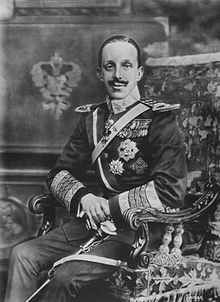

King of Spain
17 May 1886 Royal Palace of Madrid, Madrid, Kingdom of Spain
28 February 1941(1941-02-28) (54) Rome, Kingdom of Italy
NamesAlfonso León Fernando María Jaime Isidro Pascual Antonio de Borbón y Habsburgo-Lorena
King of Spain (1886-1941) (ruled 1886-1931) King of Spain Alfonso XIIIPhotograph by Kaulak, 1916King of Spain (more...) Reign17 May 1886 – 14 April 1931 (1886-05-17 – 1931-04-14 ) Enthronement17 May 1902PredecessorAlfonso XIISuccessorMonarchy abolished Juan Carlos I (1975)RegentMaria ChristinaPrime ministersPráxedes Mateo Sagasta ... among others Antonio Cánovas del Castillo Marcelo Azcárraga Francisco Silvela Antonio Maura José Canalejas Manuel García Prieto Álvaro de Figueroa Eduardo Dato Joaquín Sánchez Toca Manuel Allendesalazar Gabino Bugallal José Sánchez Guerra Miguel Primo de Rivera Dámaso Berenguer Juan Bautista Aznar Born(1886-05-17 ) 17 May 1886 Royal Palace of Madrid, Madrid, Kingdom of SpainDied28 February 1941(1941-02-28) (aged 54) Rome, Kingdom of ItalyBurialEl EscorialSpouseVictoria Eugenie of Battenberg (m. 1906)Issue more... Alfonso, Prince of Asturias Infante Jaime, Duke of Segovia Infanta Beatriz, Princess of Civitella-Cesi Infanta María Cristina, Countess Marone Infante Juan, Count of Barcelona Infante Gonzalo HouseBourbonFatherAlfonso XII of SpainMotherMaria Christina of AustriaReligionRoman CatholicismSignature Alfonso XIII (17 May 1886 – 28 February 1941), also known as El Africano or the African, was King of Spain from 17 May 1886 to 14 April 1931, when the Spanish Second Republic was proclaimed. He was a monarch from birth as his father, Alfonso XII, had died the previous year. Alfonso's mother, Maria Christina of Austria, served as regent until he assumed full powers on his sixteenth birthday in 1902. During Alfonso's reign of the Kingdom of Spain, the country experienced four major problems that contributed to the end of the liberal monarchy: the lack of real political representation of broad social groups; the poor situation of the popular classes, especially peasants; problems arising from the Rif War; and Catalan nationalism. The political and social turbulence that began with the Spanish–American War prevented the turnaround parties from establishing a true liberal democracy, which led to the establishment of the dictatorship of Miguel Primo de Rivera. With the political failure of the dictatorship, Alfonso impelled a return to the democratic normality with the intention of regenerating the regime. Nevertheless, it was abandoned by all political classes, as they felt betrayed by the King's support of the dictatorship of Primo de Rivera. He left Spain voluntarily after the municipal elections of April 1931, which were taken as a plebiscite on abolishing the monarchy. Alfonso was nicknamed "the Royal Knight of Charity" for his unprecedented work with the European War Office during World War I. For this great humanitarian endeavour, he was nominated to the Nobel Peace Prize in 1917, and came close to receiving the award, but this was ultimately won by the Red Cross. As of today, he remains the only monarch in history to have ever received a nomination to a Nobel Prize.

We use cookies
We use cookies and other tracking technologies to improve your browsing experience on our website, to show you personalized content and targeted ads, to analyze our website traffic, and to understand where our visitors are coming from. Privacy Policy.